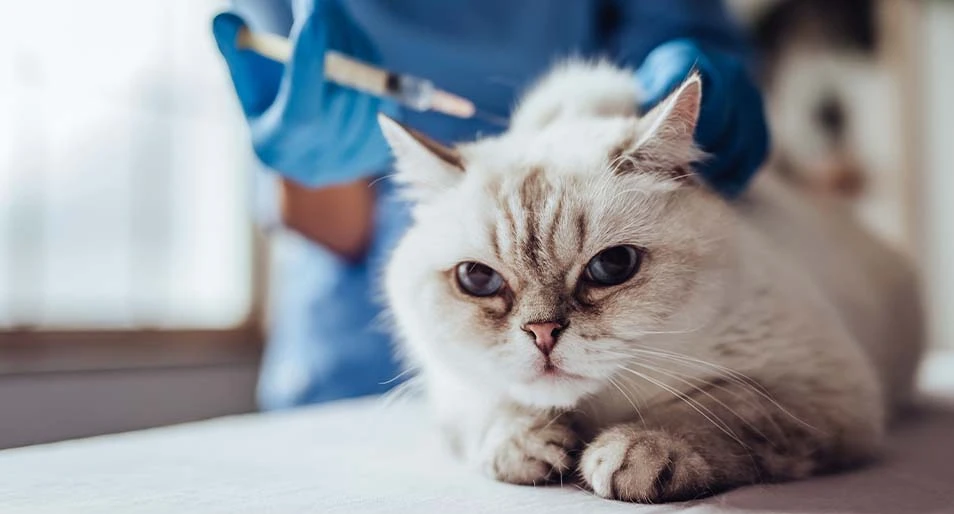PET HEALTH
FVRCP Vaccine for Cats: What It Is and How Much It Costs
The FVRCP vaccine is a 3-in-1 shot that helps protect your cat from three highly contagious diseases: panleukopenia, rhinotracheitis, and calicivirus. This vaccine usually costs between $20 and $40, depending on factors like your location and your cat’s age.1
Let’s explore what the FVRCP vaccine does, the cost details, and how pet insurance can help you pay for your kitty’s care.
Want Coverage for the FVRCP Vaccine With Your Policy?
What Is the FVRCP Vaccine for Cats?
The FVRCP vaccine is a core cat vaccine that protects against feline viral rhinotracheitis (FVR), panleukopenia (FPV), and calicivirus (FCV). These upper respiratory infections are highly contagious and spread easily through contact with an infected cat, object, or environment. They also share some similar symptoms, including:2
- Fever
- Sneezing
- Runny nose with discharge
- Eye discharge or inflammation
- Vomiting
- Lethargy
- Loss of appetite
One of the reasons this vaccine is combined is because the viruses tend to “travel” together. Vets call this feline respiratory disease complex, which is when cats are suffering from FVR and FCV at the same time.3
However, there are minor differences between these three cat diseases. Some affect cats of different ages, while others spread in specific environments. Let’s take a look at each of these diseases in greater detail to understand how you can protect your feline friend.
Feline panleukopenia (FPV)
Feline panleukopenia, sometimes called feline distemper or feline parvovirus, is a highly contagious and potentially fatal disease. The virus spreads quickly and targets cells in a cat’s bone marrow, intestines, and lymph nodes.4
Kittens, sick cats, and unvaccinated cats are most susceptible to FPV, as well as cats in places like animal shelters, boarding facilities, and pet shops. FPV can be spread through contact with nasal discharge, feces, and urine or contaminated surfaces like bedding, food bowls, litter boxes, and toys.4
Infected cats may not show any symptoms, and unfortunately, sudden death is possible. If your pet is diagnosed with FPV, it’s a good idea to isolate them from other pets until they recover.4
Feline viral rhinotracheitis (FVR)
Feline viral rhinotracheitis, or feline herpes type-1 (FHV-1), is an infection that can remain dormant and reactivate throughout a cat’s life. FVR spreads through contaminated air droplets or objects, and even cats who are in recovery.3
The virus usually starts with a fever and may cause swollen eyes and nasal passages that develop a thick, mucus-like discharge. Sores and inflammation in the mouth and eyes are also possible.3
Symptoms can last from 5 – 10 days in mild cases and up to 6 weeks in severe cases. Treatments are available to keep cats comfortable while they recover and protect them from secondary bacterial infections. However, there may be no way to get rid of the virus because it can lay dormant in your cat’s system for the rest of their life and could flare up again.3
Feline calicivirus (FCV)
Feline calicivirus has many strains, each causing different symptoms — including leg lameness, joint inflammation, painful mouth sores, and fluid buildup in the lungs.3
Cats with FCV often appear lethargic or uninterested in playing or eating, though some may not show any signs at all. Symptoms may subside in a few days with the disease completing its course in about 10 days.3
When Should My Cat Get the FVRCP Vaccine?
Keeping your cat healthy starts with the right vaccination schedule. Here’s a common timeline vets may follow for giving your cat the FVRCP vaccine:5
- First dose: As early as 6 weeks old
- Follow-up doses: Every 3 – 4 weeks, until your kitten is about 16 – 20 weeks old
- Booster shot: At around 6 months old
- Ongoing boosters: Every 3 years throughout your cat’s life
Work with your vet to stay on top of your cat’s vaccines to help keep them healthy and safe from serious illnesses.
How Much Does the FVRCP Cat Vaccine Cost?
The cost of the FVRCP vaccine depends on factors like where you live, your cat’s age, and whether it’s part of a core vaccination package. Here’s an overview of what you might expect to pay:1
- Individual FVRCP vaccine: $20 – $40 per shot
- Included in a core vaccine package: $115 – $210 total
- Booster shot (every 3 years): $35 – $50 per shot
Your vet can give you an estimate of the cost of cat vaccinations your pet needs.
Does pet insurance cover the FVRCP vaccine?
MetLife Pet offers an optional Preventive Care plan you can add to your insurance policy that could help you cover the cost of cat vaccines, including the FVRCP vaccine. It can also reimburse you for other routine wellness expenses, up to your policy’s annual limit.
Adding wellness coverage to your cat insurance plan can be a great way to make sure your furry friend stays healthy without stretching your budget. Review your policy options to see if this coverage is right for you and your kitty.
MetLife Pet Insurance Can Help With FVRCP Vaccine Costs
The FVRCP shot plays an important role in protecting your cat from serious illnesses. With our optional Preventive Care plan add-on, you can get your cat’s vaccinations covered — like the FVRCP vaccine — up to your policy’s annual limit.
Ready to see how pet insurance can help your kitty and your finances? Get a free quote today.
Our Preventive Care Plan Can Help Cover Cat Vaccines
Dr. Hunter Finn has been paid by MetLife to discuss the importance of choosing pet insurance. He is an integrative veterinary expert first, and social media star second. America’s favorite veterinarian owns Pet Method in McKinney, Texas, where he cares for pets while prioritizing their emotional well-being. When he’s not at his clinic, he’s starring in viral videos on TikTok (2 million followers) and Instagram (500K followers) — where he’s been known to snuggle puppies and conquer the latest dance trends.


